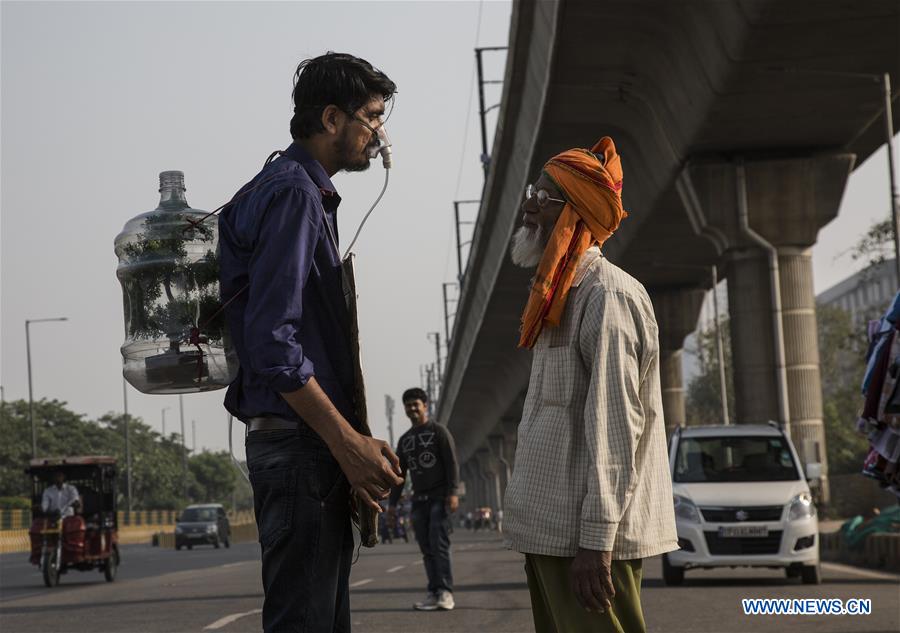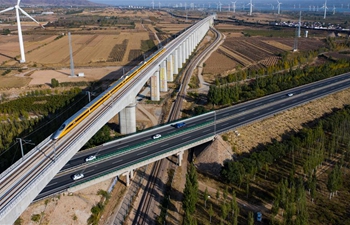
Pankaj Kumar (L, Front) talks with a passerby in Noida, on the outskirts of Delhi, India, on Dec. 1, 2019. In the highly polluted Indian capital that witnessed an alarming increase in air pollution recently, a young man named Pankaj Kumar wearing an oxygen mask and carrying a 20-liter plastic water bottle strapped to his back is an unusual attraction. (Xinhua/Javed Dar)
by Peerzada Arshad Hamid
NEW DELHI, Dec. 1 (Xinhua) -- In the highly polluted Indian capital that witnessed an alarming increase in air pollution recently, a young man wearing an oxygen mask and carrying a 20-liter plastic water bottle strapped to his back is an unusual attraction.
The oxygen mask's transparent tube is looped and fitted to the bottleneck of the water jar. From outside one can see an artificial tree in full bloom and water inside the bottle.
It appears as if the man is breathing oxygen from the bottle that otherwise is used by people in most Indian cities to carry purchased drinking water home.
Standing in the middle of the busy road on a pavement in Noida - on the outskirts of Delhi - as honking vehicles move past, the young man holds a placard to the passersby.
"Plant tree. Save tree. Otherwise, this will happen in future," reads a message in Hindi and English on the placard.
Cars and other vehicles usually sped past him without looking.
However, when the traffic lights at the nearby signal show red, those who stop close-by avidly look at his placard. Some smile, some make facial gestures and quite a lot move their heads to the other side ignoring him.
The man in his late 20s is Pankaj Kumar from the eastern state of Bihar.
For the past eight months, Kumar has embarked on a self-chosen mission to raise awareness among people in Delhi about the pollution and the importance of tree and clean environment.
Every day he straps the bottle to his back and wears the oxygen mask to roam around Noida, the emerging commercial hub bordering Delhi.
"I do the awareness for six hours every day and I have been doing this for the past eight months in Noida, Gurgoan and Delhi," Kumar told Xinhua.
Kumar works at a business process outsourcing (BPO) in Noida and has relocated to the city some 10 years ago. Kumar's father is a vegetable vendor and his mother a housewife.
"The way climate is changing in our country and the danger that increasing pollution and global warming are posing forced me to embark on this campaign," Kumar said.
"Through my exercise, I want to raise awareness among the people how important trees are."
For the second week of October pollution level in the city suddenly went up and it surpassed the hazardous mark after the Hindu festival of lights - Diwali. The city's residents set off fireworks to celebrate the festival, thereby abundantly contributing to the rising pollution and choking its air.
Last month air quality in the city remained in a hazardous range for nine consecutive days, the longest spell so far.
Following it authorities were forced to announce a public health emergency and close down schools. The government also enforced a car rationing scheme for 10 days after levels of PM 2.5 - the particulate matter that can penetrate into the lungs - in the air surpassed 999 micrograms at many locations.
The World Health Organization (WHO) places the safe limit at 25 micrograms.
As per the car rationing scheme, known as odd-even formula, private cars with odd registration numbers are allowed to run on odd dates, while as even-numbered cars would ply on even dates.
According to Kumar, efforts from the government and other non-governmental organizations to raise awareness among masses vis-a-vis environmental pollution were restricted to billboards.
"People don't have time to read the billboards, so I decided to do it in an innovate way so that people can understand the consequences of what will happen," Kumar said. "I stand on the road and don't say anything to people. They feel shocked and themselves realize that this kind of future will be there in store for them if they don't plant trees."
Kumar said he was getting encouraging responses.
"People stop by and say I am doing a good job. Even one man told me that he gave up the plan to cut 10 trees for constructing his house because of my campaign," he said.
New Delhi is among the most polluted cities in the world.
Industrial activities and vehicular traffic are significant contributors to air pollution in the city, along with rampant construction. For the past many years, every year around October-November, the air quality in New Delhi becomes hazardous.
Officials in Delhi blame the stubble burning in neighboring states of Punjab and Haryana for the increasing pollution.











